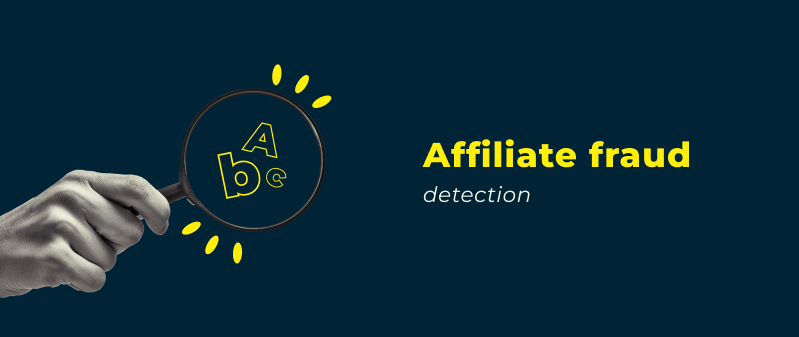DEFINITION
Affiliate fraud detection refers to the method of spotting and preventing fraudulent activities within affiliate programs.
Affiliate fraud detection refers to the method of spotting and preventing fraudulent activities within affiliate programs. The process aims to recognize and counteract deceitful clicks, fake transactions, and activities stemming from bogus accounts.
Table of contents
How does affiliate fraud detection work?
Affiliate fraud detection encompasses the tracking and surveillance of affiliate behaviors, including clicks, conversions, and finalized transactions. These actions are meticulously analyzed for inconsistencies or patterns indicative of fraud. As part of this system, the origins, intensity, and characteristics of traffic, the validity of IP addresses, the authenticity of user contact details, and transaction completion methods are scrutinized.
Should any discrepancies be identified related to an affiliate’s actions, they could face suspension or total removal from the program. Given the potential financial implications of fraud for advertisers, such preventive measures are imperative.
What technologies and tools are used for affiliate fraud detection?
Affiliate fraud detection leverages tools like Google Analytics, Adobe Analytics, and proprietary affiliate program systems. Specialized algorithms are also employed to discern suspicious activities based on established patterns.
Such technologies can pinpoint traffic sources, verify user data, and scrutinize transaction details. To deter fraud, risk assessment technologies, grounded in various factors and historical records, are utilized. Moreover, tools are in place to detect bot-generated traffic, evaluate the reputation of IP addresses, and validate payments. Advanced technologies are also implemented to examine patterns, behaviors, and data to pinpoint potential fraudulent intents.
What are the advantages of using affiliate fraud detection by affiliate networks?
Affiliate fraud detection ensures the integrity and fairness of programs. Advertisers are shielded from possible financial setbacks, while legitimate affiliates benefit from a transparent environment. Dishonest affiliates face penalties or expulsion, which bolsters the opportunities for genuine partners.
What are the types of affiliate fraud?
Affiliates might resort to several deceptive practices, including:
- Fake clicks: Artificially boosting activity on an affiliated website.
- Fake conversions: Primarily in scenarios where commissions are earned post-registration, deceitful accounts might be created.
- Fake traffic: Traffic generated via bots or malicious software.
- Personal purchases: Affiliates purchasing through their referral links to garner commissions.
- Collusion with fraudsters: Some affiliates might delegate fraudulent activities to external entities.
- Plagiarism: Affiliates duplicating content from other affiliates or partners, leading to misinformation and unfair competition.
- Regulation breaches: Non-compliance with affiliate program guidelines can also be construed as fraudulent behavior.
What are the negative effects of affiliate fraud on affiliates and affiliate programs?
For affiliates, the repercussions of engaging in fraudulent activities include:
- Expulsion from the program.
- Monetary penalties.
- Potential legal ramifications.
- Permanent ban from rejoining the program.
For advertisers, the adverse impacts are:
- Financial losses due to dishonest practices.
- Reputation damage, with potential blame for fraudulent acts.
- Flawed campaign results, with incorrect data potentially leading to misguided marketing strategies.
- Increased affiliate program management complexity, demanding extra effort and time.
- Distorted data potentially impacting advertising endeavors outside the affiliate program.



